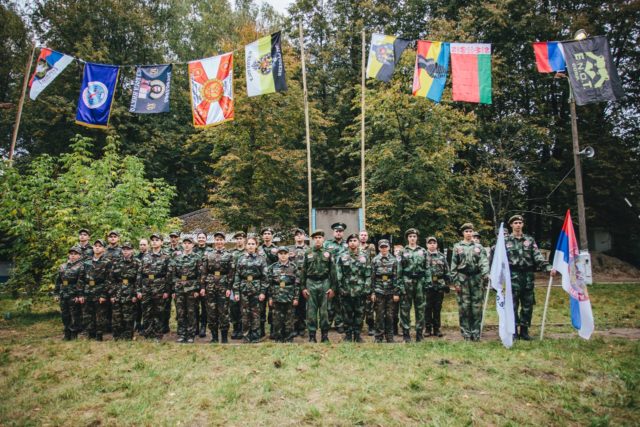
Moscow Again Training More Belarusian Youths in Ultra-Right Camps in Russia
Publication: Eurasia Daily Monitor Volume: 14 Issue: 153
By:

The Russian government is committed to ensuring that Belarus remains dependent on Moscow and serves as a buffer state between the Russian Federation and the North Atlantic Treaty Organization (NATO) (Minskdialogue.by, November 17). But because Russia lacks the ability to win an honest competition for Belarusian loyalty openly, as Moscow-based commentators point out (Kasparov.ru, November 28), the Kremlin is increasingly turning to subversive measures, including the training of young Belarusians in ultra-right-wing military camps near the Russian capital.
Moscow could use the graduates of these training centers to destabilize the situation in Belarus while maintaining some level of plausible deniability: Russian authorities could claim Moscow was not behind these groups. But even if these graduates are never actively deployed, their very existence represents an implicit threat to Belarusian security, one that Minsk cannot afford to ignore. Furthermore, the training camps serve to remind the West that Vladimir Putin, whatever lessons he may have learned from his aggression in Ukraine, remains committed to what many euphemistically call “hybrid” war—or what is more properly termed “active subversion.”
Russia has been training groups of Belarusian young people in paramilitary camps over at least the last several years (Windowoneurasia2.blogspot.com, November 2, 2015 and May 31, 2016; Nasha Niva, December 31, 2015; Svaboda.org, May 18, 2016) But now, reports suggest, Moscow’s efforts in this regard have expanded dramatically, a possible indication of Russian intentions regarding Belarus in the near future.
This fall, a number of Belarusian outlets featured reports, including pictures and interviews with those involved, that Moscow is providing paramilitary and ideological training to a large group of young Belarusians of both sexes in camps run by the shadowy ENOT Corporation near the Russian capital (Belsat, September 24; BelarusPartisan, September 25, November 24). That company—which has its own website, Enotcorp.org—is part of Moscow’s newly expanded paramilitary effort and has been involved in recruiting and sending Russian mercenaries to Ukraine and to Syria. But it is also notorious for its links to Russian neo-Nazi groups that have served as its recruiters in the past.
The ENOT camps’ true purpose is reflected in the fact that its “main instructor,” Roman Telenkevich, at the same time heads “The Union of Donbas Volunteers.” Furthermore, ENOT is bringing to these camps young people from all existing hotspots in Eurasia, such as Transnistria and South Ossetia, and from places some may want to turn into hotspots, such as Belarus and the Balkans. At a public conference at the end of September, some 400 young people, most in their teens, publicly showed their commitment to Russian imperial and xenophobic values. The majority were from these various places across the post-Soviet space, including a number—unspecified by Belarusian sources—from Belarus (Belsat, September 24).
In early 2016, the Russian Orthodox Church and the Russian government actively recruited Belarusians to take part in paramilitary camps inside Belarus. When Belarusian opposition figures protested, Belarusian Ministry of Internal Affairs said it had investigated and found no problems, a possible indication of collusion between some in that institution and other institutions in the Belarusian government. That possibility is now a probability given that several Belarusian officials have visited the ENOT camp this fall and even been willing to speak with journalists about it, insisting that there is nothing wrong with young Belarusians wanting to gain such paramilitary instruction and even suggesting that such people will form a useful addition to the country’s Armed Forces in the future (Belsat, September 24).
But as Belsat points out, such assertions whitewash what is happening: “There can be no doubt as to the radical right views of the ENOT graduates.” Moreover, following a beating in Russia of a citizen of Tajikistan, the ENOT company website published a call to “destroy the nest of insolent illegals.” That Belarusians are again being drawn into this is worrisome, Belarusian democrats say, not only for what it says about the intentions of this group in Russia itself but also because of what it suggests are Moscow’s plans for these people on their return to Belarus (Belsat, September 24).
ENOT leaders, Belsat and BelarusPartisan argue, claim that they have set up cells of Belarusian graduates of these camps near Moscow in the Belarusian cities of Borisov, Mohylev and Bobruisk. No one has been able to confirm the existence of such organizations, an indication that such claims may be part of a propaganda effort intended to destabilize Belarus by spreading fear. But that too is one of the reasons why the Russian camps exist: They show that Moscow could establish such organizations if it wanted to and that the Belarusian security services are unable or unwilling to do anything about it (Belsat, September 24; BelarusPartisan, September 25, November 24).
That the ENOT Corporation is involved in such efforts is suggested by a recent comment by Anton Gorokhov, one of the company’s leaders, after a visit to Belarus: “We came for talks with the local organs of power. There is a commercial interest” in the services we provide. However, he added, “at the request of your officials, no details are to be released.” At the same, he said, “the goal of the talks is the formation of a joint program for the preparation of young people for service in the army” (BelarusPartisan, September 25).
Most disturbingly of all, Gorokhov said that he had conducted talks “above the regional level” (BelarusPartisan, September 25), an indication that he may have made contacts with Belarusian officials in Minsk. If that is so, it illustrates that the Russian hybrid war of subversion against Belarus may be truly taking off, to the detriment of Belarusian rights and freedoms and even independence.



